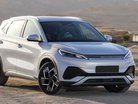Chinese Clean Car Manufacturers Excel in Europe

Chinese car manufacturers like BYD, Hongqi, Great Wall Motors (GWM) and Xpeng are excelling at establishing themselves as relevant brands in Europe.
China and Europe are the world’s largest electric vehicle (EV) markets. European carmakers have long been exporting cars to China and establishing numerous production sites and joint ventures there. Now, Chinese brands are reversing the trend by entering the European market. Consulting firm Inovev noted that about 75,000 new cars from Chinese manufacturers were registered in Europe in the first half of 2022, with an expected 150,000 units for the rest of the year.
Manufacturers like Nio, after successfully launching in Norway, have expanded out into the influential German market. Cars owned by Chinese brands SAIC Motors and Geely, like the MG and Polestar have ascended to the top 20 best-selling EVs in Europe.
China has particularly excelled with its clean cars, aka EVs. As one of the world’s biggest EV markets, the nation's manufacturers are emerging as leaders in EV development, establishing joint ventures and production sites across Europe.
Seeking to increase international competitiveness and expand investment beyond developing economies, this emerging dominance is driven by the nation’s long-standing innovation and experimentation with clean automation.
With an eye for the future, innovative Chinese automotive manufacturers have been exploring a variety of different approaches to clean vehicles since the 2010s. Manufacturers BYD and Geely have explored advancements with buses and motorbikes, helping to test the limits and explore the applications of EV battery technology.
As early as 2009, BYD was using electric buses as an entry product into North American markets. In 2013, the manufacturer was supplying them as fleet vehicles to the Los Angeles Metro System and today the buses are visible in the South American market.
Geely meanwhile has experimented with motorbikes, which require lighter batteries with superior portability compared to cars. By approaching these two different ends of the EV automotive spectrum, both manufacturers have helped boost the manufacturing development of clean vehicles across China.
Their progress has also been supported by collaboration with the government and industry within China. In 2009, the Chinese Government offered subsidies for the purchase of full EVs and hybrid vehicles, as well as buses across Beijing, Xi’an and other major cities. This has contributed to the popularity of EVs in China, with BNEF estimating plug-in cars will make up to 40% of sales in 2024.
A major driver for the popularity of Chinese EVs is a focus on connectivity and advanced technology from manufacturers.
These include Hongqi’s charging systems and autonomous parking feature which streamline the driving process and Nio’s battery swapping services which enable customers to easily replace and lease EV batteries. Functionality like this appeals to the broader EV market, who are tech-savvy, young and prioritise flexibility.
Chinese manufacturers are making major inroads to the European automotive market, through providing digitally agile, competitively priced alternatives.
This development highlights the importance of cross-sector collaboration to boost manufacturing innovation. With government and industry support, manufacturers can more effectively experiment, evolve and market products, a fact which extends beyond the automotive industry.
******
Make sure you check out the latest edition of Manufacturing Digital and also sign up to our global conference series - Procurement & Supply Chain 2024 & Sustainability LIVE 2024
******
Manufacturing Digital is a BizClik brand.
- Manufacturing & Mobility LIVE: The Future of EVs & MobilitySustainability & ESG
- Saab: Automotive Repurposing for Sustainable SuccessSustainability & ESG
- Stellantis & CATL Boost EV Manufacturing CapacitySustainability & ESG
- Formula E: Shaping the Innovative Future of EV ManufacturingSustainability & ESG


